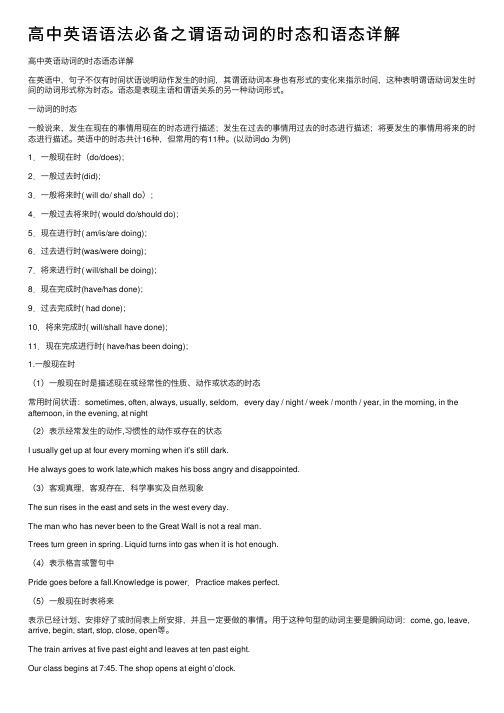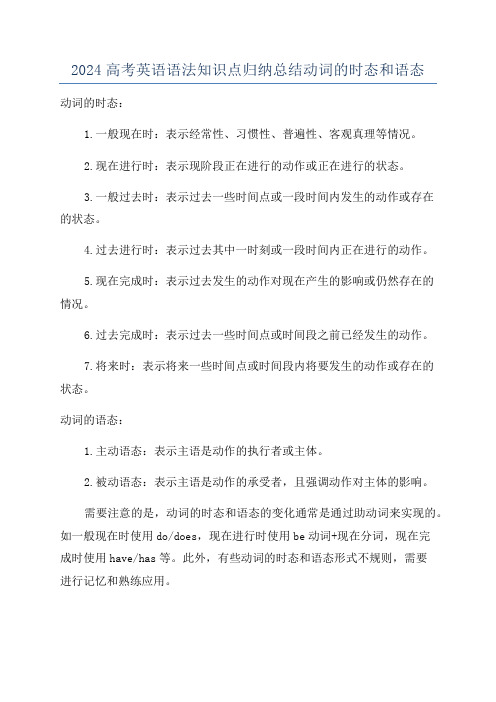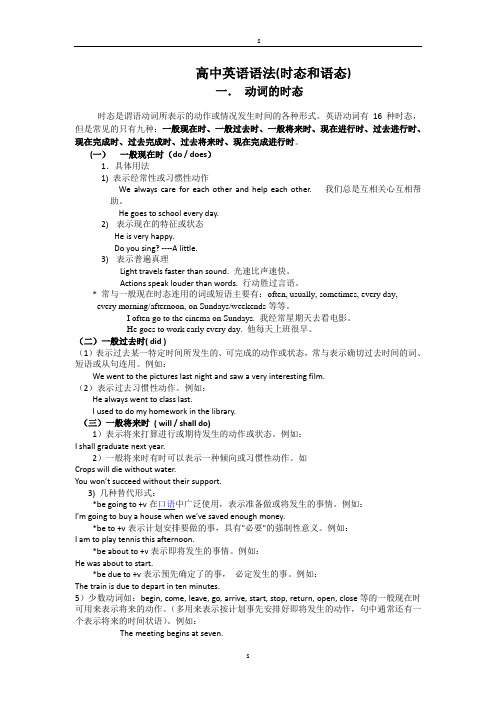高中语法专题动词时态和语态
高中语法动词的时态和语态

一、一般现在时1、表示经常发生的习惯性的、现在反复出现的动作或状态,常用的时间状语有:always,usually,seldom, sometimes, every day, now and then, once a week等。
2、表示眼下或目前等现在时间所发生的动作或存在的状态,这种状态带有一定的持续性。
3、表示客观事实或普遍真理。
4、书报的标题,故事的叙述,小说、戏剧、电影等情节介绍,图片的说明等。
5、时间表、时刻表、日程表、节目单、课程表等按规定将要发生的动作,只限于go, arrive, leave, start, stay, return, begin, come等动词。
6、在时间、条件、方式、让步状语从句中,表示将来的动作。
注意:一般现在时可以用于定语从句或宾语从句中表示将来。
7、用在某些表达中,表示现在正在发生的动作或存在的状态。
Here comes the bus!How it rains!二、一般过去时1、表示在过去某一时间点发生的动作或所处的状态,与现在没有关系。
常用的时间状语有:yesterday, last night, at that time等。
2、表示在过去某一段时间里反复出现的动作或状态,与现在没有关系。
3、用used to do或would do表示过去经常或反复发生的动作。
4、有些情况发生的时间没清楚表明,但实际上是“刚才,刚刚”发生的,属于过去时间,应使用过去时态。
常见的有I didn’t know…或I forgot…等。
5、一般过去时可与today, this week, this month等时间状语连用。
三、一般将来时1、will/shall do(1)表示将来会出现的动作或状态。
常用的时间状语:this evening, tomorrow, next week/month…,at the end of this term, in a few minutes等。
高中英语动词的时态和语态

高中英语动词的时态和语态1、表示在过去某一时间点发生的动作或所处的状态,与现在没有关系。
常用的时间状语有:yesterday, last night, at that time等。
2、表示在过去某一段时间里反复出现的动作或状态,与现在没有关系。
3、用used to do或would do表示过去经常或反复发生的动作。
4、有些情况发生的时间没清楚表明,但实际上是“刚才,刚刚”发生的,属于过去时间,应使用过去时态。
常见的有I didn’t know…或I forgot…等。
5、一般过去时可与today, this week, this month等时间状语连用。
三、一般将来时1、will/shall do(1)表示将来会出现的动作或状态。
常用的时间状语:this evening, tomorrow, next week/month…,at the end of this term, in a few minutes等。
(2)表示将来经常发生的动作。
(3)表示事物的固有属性或必然趋势、倾向。
(4)表示说话过程中做出某种决定。
注意:条件状语从句中的will表示“决心,意愿”,此时will是情态动词表示意愿。
2、be going to do(1)表示已经决定或安排要做的事。
(2)表示根据某种迹象认为在最近或将来将要发生的事。
3、be to do(1)表示约定、计划或按职责、义务要求即将发生的动作。
(2)表示说话人的意志、意图、职责、义务、命令。
(3)表示注定要发生的事情。
4、be about to do(1)表示即将发生的动作,意为“正要,即将”。
(2)不可与表示具体的将来时间的副词或副词性短语连用,但可以同由as或when 引导的时间状语从句连用。
5、某些动词的现在进行时表示即将发生的动作。
四、过去将来时1、would/should do表示从过去某一时间来看将要发生的动作或将要存在的状态。
通常用于其主句的谓语为过去时态的宾语从句中。
高中英语语法必备之谓语动词的时态和语态详解

⾼中英语语法必备之谓语动词的时态和语态详解⾼中英语动词的时态语态详解在英语中,句⼦不仅有时间状语说明动作发⽣的时间,其谓语动词本⾝也有形式的变化来指⽰时间,这种表明谓语动词发⽣时间的动词形式称为时态。
语态是表现主语和谓语关系的另⼀种动词形式。
⼀动词的时态⼀般说来,发⽣在现在的事情⽤现在的时态进⾏描述;发⽣在过去的事情⽤过去的时态进⾏描述;将要发⽣的事情⽤将来的时态进⾏描述。
英语中的时态共计16种,但常⽤的有11种。
(以动词do 为例)1.⼀般现在时(do/does);2.⼀般过去时(did);3.⼀般将来时( will do/ shall do);4.⼀般过去将来时( would do/should do);5.现在进⾏时( am/is/are doing);6.过去进⾏时(was/were doing);7.将来进⾏时( will/shall be doing);8.现在完成时(have/has done);9.过去完成时( had done);10.将来完成时( will/shall have done);11.现在完成进⾏时( have/has been doing);1.⼀般现在时(1)⼀般现在时是描述现在或经常性的性质、动作或状态的时态常⽤时间状语:sometimes, often, always, usually, seldom,every day / night / week / month / year, in the morning, in the afternoon, in the evening, at night(2)表⽰经常发⽣的动作,习惯性的动作或存在的状态I usually get up at four every morning when it’s still dark.He always goes to work late,which makes his boss angry and disappointed.(3)客观真理,客观存在,科学事实及⾃然现象The sun rises in the east and sets in the west every day.The man who has never been to the Great Wall is not a real man.Trees turn green in spring. Liquid turns into gas when it is hot enough.(4)表⽰格⾔或警句中Pride goes before a fall.Knowledge is power.Practice makes perfect.(5)⼀般现在时表将来表⽰已经计划、安排好了或时间表上所安排,并且⼀定要做的事情。
2024高考英语语法知识点归纳总结动词的时态和语态

2024高考英语语法知识点归纳总结动词的时态和语态
动词的时态:
1.一般现在时:表示经常性、习惯性、普遍性、客观真理等情况。
2.现在进行时:表示现阶段正在进行的动作或正在进行的状态。
3.一般过去时:表示过去一些时间点或一段时间内发生的动作或存在
的状态。
4.过去进行时:表示过去其中一时刻或一段时间内正在进行的动作。
5.现在完成时:表示过去发生的动作对现在产生的影响或仍然存在的
情况。
6.过去完成时:表示过去一些时间点或时间段之前已经发生的动作。
7.将来时:表示将来一些时间点或时间段内将要发生的动作或存在的
状态。
动词的语态:
1.主动语态:表示主语是动作的执行者或主体。
2.被动语态:表示主语是动作的承受者,且强调动作对主体的影响。
需要注意的是,动词的时态和语态的变化通常是通过助动词来实现的。
如一般现在时使用do/does,现在进行时使用be动词+现在分词,现在完
成时使用have/has等。
此外,有些动词的时态和语态形式不规则,需要
进行记忆和熟练应用。
(完整版)高中语法之常用时态语态详解

第四章时态和语态一.动词的时态英语时态用共有十六种时态,其中常用的有8种,它们是:一般现在时、一般过去时、一般将来时、现在进行时、现在完成时、过去进行时、过去完成时和过去将来时。
一. 一般现在时.1.构成. be动词:am is are ; 其他动词用动词原形,当主语是第三人称单数时要在谓语动词后加“s”,其变化规则与名词变复数一致。
2.用法. 1). 经常性或习惯性的动作,常与表示频度的时间状语连用。
如usually, always, often, seldom, never, every...,eg. I leave home for school at 7 every morning.I don’t leave home for school at 7 every morning.Do I leave home for school at 7 every morning?He usually gets up early.He doesn’t usually get up early.Does he usually get up early?2) 客观真理,客观存在,科学事实。
eg. The earth moves around the sun.The earth doesn’t move around the sun 否定句Does the earth move around the sun? 疑问句Shanghai lies in the east of China.Shanghai doesn’t lie in the east of China 否定句Does Shanghai lie in the east of China? 疑问句Water boils at 100 centigrade degrees.3) 表示格言或警句中eg. Pride goes before a fall.注意. 此用法如果出现在宾语从句中,即使主句是过去时,从句谓语也要用一般现在时。
语法解析动词时态和语态

语法解析动词时态和语态动词是语法中一个非常重要的词类,它在句子中负责表达动作、状态、事件的发生或存在。
动词的时态和语态是我们在学习和使用动词时需要重点关注的两个方面。
本文将对动词的时态和语态进行详细的解析和讨论。
一、动词的时态动词的时态指的是动作发生的时间,主要分为一般现在时、一般过去时、一般将来时等几种。
1. 一般现在时(Simple Present Tense)一般现在时表示经常性或习惯性的动作、客观真理、科学事实等。
例如:- He reads books every day.(他每天都读书。
)- Water boils at 100 degrees Celsius.(水在100摄氏度时煮沸。
)2. 一般过去时(Simple Past Tense)一般过去时表示过去某个时间发生的动作或存在的状态。
例如:- They went to the park yesterday.(他们昨天去了公园。
)- Mary studied English when she was in college.(玛丽上大学时学习了英语。
)3. 一般将来时(Simple Future Tense)一般将来时表示将来某个时间将要发生的动作或存在的状态。
例如:- I will travel to Beijing next month.(我下个月将去北京旅行。
)- They are going to have a party tonight.(他们今晚将举办一个派对。
)除了上述的三种基本时态,动词还有一些其他的时态形式,如现在进行时、过去进行时、将来进行时、现在完成时、过去完成时、将来完成时等。
这些时态形式在表达不同的情况和语境时使用,可以增强句子的准确度和表达力。
二、动词的语态动词的语态指的是动作的主体和所受到的影响,主要分为主动语态和被动语态两种。
1. 主动语态(Active Voice)主动语态表示主体执行动作或发生状态。
高中英语专练动词的时态和语态(含答案)

第五章动词的时态和语态Ⅰ.动态的时态专项练习( )1.Life like a box of chocolate; you never know what you get.A. is going to be; willB. is; are going toC. will be; are toD. has been; are about to( )2.You things about. Look, what a mess in your room!A.were always throwingB. are always throwingC. always throwD. always threw( ) 3. On Monday mornings it usually me an hour to drive to work although the actual distance is only 20 miles,A.will takeB. is takingC. tookD. takes( )4.If it an interesting film, we'll see it tomorrow.A.will be iB. is going to beC. isD.is to be( ) 5. That piece of music sounds quite familiar. Who the piano upstairs?A. playsB. is playingC. playedD. was playing参考答案:1-5 B B D C B专项练习( ) 1. The price recently, but I doubt it will remain so.A.has increasedB. increasedC. increasesD. is increasing( )2.Now that you from abroad, what are you going to do?A. returnedB. returnC. have returnedD. have been returning( ) 3. The small country since the 1880s.A.has come into existenceB. has been in existenceC. has been existedD. has begun to exist( )4.He for quite a long time.A. has come hereB. hasn't come hereC. has left for AmericaD. has received my e-mail( ) 5. The girl has a great interest in sport and badminton classess twice a week over the last three years.A. tookB. had takenC. has takenD. had been taking参考答案:ACBDC专项练习( ) 1. I'm calling about the apartment you the other day. Could you tell me more about it?A. had advertisedB. advertisedC. has advertisedD. advertise( ) 2. He was unhappy when he sold his guitar. After all, he it for a very long time.A.has hadB. hadC. hasD. had had( ) 3. --Did you catch what I said?- -Sorry. I a text message just now.A.answeredB. have answeredC. was answeringD. had answered( ) 4. -Has Tom finished his composition yet?-I have no idea; he it this morning.A. wroteB. has writtenC. was writingD. had written( ) 5. My uncle went to Canada 2 years ago. He there for a few months and then went to America.A.would workB. had workedC. has workedD. worked( ) 6. The year 2010 remarkable changes in Shanghai's landscape.A.has seenB. had seenC.sawD. was seeing( ) 7. I first met Lisa 3 years ago. She at a radio shop at that time.A.workedB. had been workingC. was workingD. had worked( )8.We to be able to arrive before six, but we were caught in a heavy traffic jam.A. hopedB. had hopedC. has hopedD. had been hoping1-5BDACB 6-8CAB专项练习( ) 1. -Did you tell Julia about the result?- -Oh, no, I forgot. I her now.A.calledB. will callC. am callingD. was calling( )2.He his office when the telephone rang.A. leftB. would leaveC. was leavingD. has left( ) 3. I wouldn't be able to attend your birthday party at eight o'clock tomorrow evening because I to America at that time.A.will flyB. will be flyingC. am flyingD. fly( )4.Tom close the windows when his attention was caught by a bird.A.was toB. was likely toC. was due toD. was about to( ) 5. By the time you are back this evening, I all the work.A.will doB. will be doingC. will have doneD. am going to do( ) 6. The conference a full week by the time it ends.A.must have lastedB. should have lastedC. would have lastedD. will have lasted参考答案:BCB DCD专项练习( ) 1. -Have you thought of a topic for your article yet?- -No, I a lot about it, but I haven't decided.A.have thoughtB. have been thinkingC. had thoughtD. thought( )2.You know,I for a job for 3 months, and this is my first formal interview. A. looked B. have looked C. have been looking D. had looked( ) 3. The little boy is dirty all over because he in the mud all the morning.A. has playedB. playedC. has been playingD. had played( ) 4. I'm sure you will do better in the test because you so hard this year.A. studiedB. have studiedC. have been studyingD. had been studying( )5.You the novel for almost 6 hours. Why not join us and have a cup of tea?A.have readB. have been readingC. had readD. read1-5 BCCCB专项练习( ) 1. The discovery of gold in Australia led thousands to believe that a fortune .A.is madeB. would makeC. was to be madeD. had made( ) 2. Mum, I was wondering if you could lend me a few dollars until I on Firday.A. got paidB. get paidC. have paidD. have been paid( ) 3. Many students apply for a position at that company, but only a few .A. acceptedB. were accptedC. are acceptedD. had been accepted( ) 4. The novel I bought yesterday .A.is very worth readingB. is very worth being readC. is well worth readingD. is well worth being read ( ) 5. Whether a book depends on many factors.A. is sold goodB. sells goodC. is sold wellD. sells well综合练习Ⅰ.单项选择( ) 1. The center of gravity of the human body behind his joint.A.locatedB. locatingC. to locateD. is located( ) 2. -What happened in that new area?-New houses recently over there.A.are builtB. buildC. have builtD. have been built( ) 3. -When did you go to work?- -As soon as they came, we to work.A.wentB. were goingC. had goneD. go( ) 4. Perhaps it will be a long time from abroad.A.when Tom comes backB. when Tom will come backC. before Tom comes backD. that Tom comes back( )5.We on it for many hours, but we have not yet reached any conclusion.A. are being workedB. are workingC. have been workingD. have been worked( ) 6. My uncel, Sam, manager of the firm.A.have just madeB. is just being madeC. has just been madeD. is just made( ) 7. Elections every four years and Congress meets once a year.A.are taken placeB. are to be taken placeC. took palceD. take place( ) 8. The new type of machine the year after next.A.is going to turn outB. is going to being turned outC. is going to have turned outD. is going to be turned out( )9.He said such a thing to happen.A.ought to be not allowedB. ought not to be allowingC. ought not to have allowedD. ought not to be allowed( ) 10. She told me that her proposalA.needed to be take into considerationB.needed to be taken into considerationC.needed to be taking into considerationD. needed to have taken into consideration( ) 11. The government to approve the use of widespread surveillance when the Justice Department took objections.A.is goingB. had beenC. was aboutD. is coming( ) 12. You ought to a test in physics the day before, I think.A.have takenB. takeC. be takenD. be taking( ) 13. This is one of the best novels that this year.A.appearsB. is appearingC. has appearedD. have appeared( ) 14. We had hardly sat down when she plates of food for us.A.broughtB. has broughtC. had broughtD. was bringing( ) 15. A friend of mine returned to his house after a holiday, only to find itA. be broken intoB. was broken intoC. had broken intoD. had been broken into( ) 16. What I was uncertain about whether they could overcome the difficulties.A.isB. will beC. had beenD. was( ) 17. By the time the course ends, a lot about Britain.A.we'll learnB. we are learningC. we have learntD. we'll have learnt( ) 18. He will come to call on you the moment he his work.A.will finishB. finishesC. had finishedD. finished( ) 19. I thought Jim would say something about his school report, but he it.A.doesn't mentionB. hadn't mentionedC. didn't mentionD. hasn't mentioned( ) 20. The first use of atomic weapons was in 1945, and their power increased enormously even since.A. isB. wasC. has beenD. had been( ) 21. The number of deaths from heart disease will be reduced greatly if people to eat more fruit and vegetables.A.persuadeB. will be persuadedC. be persuadedD. are persuaded( ) 22. More than a dozen students in that school abroad to study medicine last year.A.sentB. were sentC. has been sentD. had been sent( ) 23. Send my regards to your lovely wife when you home.A. wroteB. will write c. have written D. write( ) 24. When he turned professional at the age of 11, Mike to become a world champion by his coach and parents.A. expectedB. was expectingC. was expectedD. would be expected( ) 25. With the help of high technology, more and more substances in the past years.A. discoveredB. have discoveredC. had been discoveredD. have been discovered( ) 26. -Do you know if Terry will go camping this weekend?- -Terry? Never! She tents and fresh air!A.has hatedB. hatedC. will hateD. hates( ) 27. In recent years, many football clubs as business to make a profit.A. have runB. have been runC. had been runD. will run( ) 28. During the period of recent terrorist activities, people not to touch an unattended bag.A.had always been warnedB. were always being warnedC. are always warningD. always warned( ) 29. Every few years, the coal workers their lungs X-rayed to ensure their health,A. are havingB. haveC. have hadD. had had( ) 30. The church tower which will be open to tourists soon. The work is almost finished.A.has restoredB. has been restoredC. is restoringD. is being restored( ) 31. After getting lost in a storm, a member of the navy team four days later.A. rescuedB. was rescuedC. has rescuedD. had been rescued( ) 32. Is honesty the best policy? We that it is when we are young,A.will teachB. teachC. are taught D, will be taught( ) 33. -I hear that Jason is planning to buy a car-I know. By next month, he enough money for a used one.A. will have savedB. will be savingC. has savedD. saves( ) 34. The school board is made up of parents who to make decisions about school affairs.A.had been electedB. had electedC. have been electedD. have elected( ) 35. The flowers sweet in the botanic garden attract the vistors to the beauty of nature.A. to smellB. smellingC. smeltD. to be smeltⅡ.用动词的适当形式填空。
(完整)高中英语语法(时态和语态)

高中英语语法(时态和语态)一.动词的时态时态是谓语动词所表示的动作或情况发生时间的各种形式。
英语动词有16种时态,但是常见的只有九种:一般现在时、一般过去时、一般将来时、现在进行时、过去进行时、现在完成时、过去完成时、过去将来时、现在完成进行时。
(一)一般现在时(do / does)1.具体用法1) 表示经常性或习惯性动作We always care for each other and help each other. 我们总是互相关心互相帮助。
He goes to school every day.2)表示现在的特征或状态He is very happy.Do you sing? ----A little.3)表示普遍真理Light travels faster than sound. 光速比声速快。
Actions speak louder than words. 行动胜过言语。
* 常与一般现在时态连用的词或短语主要有:often, usually, sometimes, every day,every morning/afternoon, on Sundays/weekends等等。
I often go to the cinema on Sundays. 我经常星期天去看电影。
He goes to work early every day. 他每天上班很早。
(二)一般过去时( did )(1)表示过去某一特定时间所发生的、可完成的动作或状态,常与表示确切过去时间的词、短语或从句连用。
例如:We went to the pictures last night and saw a very interesting film.(2)表示过去习惯性动作。
例如:He always went to class last.I used to do my homework in the library.(三)一般将来时( will / shall do)1)表示将来打算进行或期待发生的动作或状态。
- 1、下载文档前请自行甄别文档内容的完整性,平台不提供额外的编辑、内容补充、找答案等附加服务。
- 2、"仅部分预览"的文档,不可在线预览部分如存在完整性等问题,可反馈申请退款(可完整预览的文档不适用该条件!)。
- 3、如文档侵犯您的权益,请联系客服反馈,我们会尽快为您处理(人工客服工作时间:9:00-18:30)。
第一章动词的时态和语态考点概说动词是一门语言的核心,与动词相关的考点历来是各类考试的热点。
动词的时态和语态同样也是考试的热点之一。
动词的时态是从动作发生的时间和状态两个维度来定义的,时间包括:过去、现在、将来和过去将来四种;状态包括:一般、进行、完成和完成进行四种。
因此,英语中共有16种时态,但是常用和常考的有如下几种:(1)一般现在时:①现在的事实或真理②主将从现;(2)一般过去时:①过去的事实②刚刚、刚才发生的动作(暗含现在不那样了);(3)一般将来时:表示将来发生的动作;(4)现在进行时:①表示现在正在进行②表示现阶段主要做的事情③短暂动词的进行时表示将来;(5)过去进行时:①表示过去某一时刻正在进行②表示过去一个阶段主要做的事情;(6)现在完成时:表示过去开始的动作,到现在完成,对现在产生一定的影响;(7)现在完成进行时:①过去开始的动作持续到现在,可能完成,也可能继续②过去开始的动作一直持续到现在;(8)过去完成时:表示过去的过去。
突破目标对英语时态、语态的学习和备考,应注意以下几个方面:(1)掌握各种时态的使用条件;(2)积累各种时态常见的时间状语;(3)掌握各种时态的构成形式;(4)掌握各种时态的助动词;(5)掌握各种时态的四种基本句式;(6)掌握各种时态被动语态的构成形式。
考试心得笔者结合近几年的考试真题和教学辅导经验,总结出了以下几条心得:(1)时间状语是做时态题的重要依据,平时要多积累、多总结;(2)读懂句子,深入语境,认真体会动作发生的真实语境;(3)准确把握动作发生的时间是做时态题的关键。
第一节一般现在时的用法1-1-1考点表示现在的事实或真理(1)一般现在时表示现在的事实、通常的动作等。
注意:用一般现在时,表示现在还是那样;用一般过去时,表示现在不那样了。
(2)一般现在时还用在对普遍真理及客观事实的描述中,特别是用在宾语从句中时,不受主句时态的影响。
★经典例题1On Monday mornings it usually me an hour to drive to work although the actual distance is only 20 miles.A. TakesB.is takingC.tookD.will take【点评】考查一般现在时表示通常的动作【详解】根据时间状语 On Monday mornings 和频度副词 usually的提示,可知这里讲述的是一般的事实、通常的动作。
故选A.【句意】周一早上我开车上班通常要花一个小时,尽管确切的路程只有20英里。
★经典例题2My parents in Hong Kong. They were born there and have never lived anywhere else.A.liveB.livedC.were livingD.will live【点评】考查一般现在时表示现在的事实【详解】从后面的信息看,他的父母出生在香港,没有在别的地方住过,可知他们现在仍然住在香港,所以用一般现在时表示现在的事实。
故选A.【句意】我的父母住在香港。
他们在香港出生,从没有在别的地方住过。
★经典例题3Last year, the teacher told us that the sun bigger than the earth.A.has beenB.wasC.isD.will be【点评】考查一般现在时表示普遍真理【详解】本题宾语从句讲述的是普遍真理,其时态不受主句中一般过去时的影响,仍要用一般现在时。
故选C.【句意】去年老师告诉我们太阳比地球大。
1-1-2考点用在状语从句中表示将来,即主将从现主句为一般将来时,时间或条件状语从句中,要用一般现在时表示将来。
★经典例题1She is going to be a nurse when she up.A. is going to growB.growsC.growingD.grew【点评】考查一般现在时表示将来的用法【详解】本题中,主句使用了一般将来时(is going to be),when 引导的时间状语从句中要用一般现在时表示将来。
故选B.【句意】她长大后想当一名护士。
★经典例题2He will surely finish the job on time if he to do it in his own way.A.is leavingB. will leaveC.leavesD.is left【点评】考查一般现在时表示将来的用法【详解】if引导的状语从句中用一般现在时表示将来,排除A、B;he和leave“使处于某种状态”是被动关系,所以用被动语态。
故选D.【句意】要是让他用自己的方式做,他一定会按时完成这项工作。
★经典例题3Could you ask him if he to my birthday party next Sunday?-I will, if I him this afternoon.es; will meetB. will come; meetes; meetD.will come; will meet【点评】考查if引导的从句辨认以及一般现在时表示将来的用法【详解】第一句中,if引导的从句用在ask him后,if意为“是否”,引导宾语从句。
根据时间状语 next Sunday 的提示,可知用一般将来时,排除A、C;第二句中的if意为“如果”,引导的从句为条件状语从句,要用一般现在时表示将来。
故选B.【句意】-你能问问他下星期天是否来参加我的生日聚会吗?-如果今天下午我见到他,我会问的。
第二节一般过去时的用法1-2-1考点表示过去的事实一般过去时用来表示过去的事实,通常有明显的过去时间状语,如just now,yesterday, last week/ month / year, in 2008, three days / years...ago等。
有些题目中,虽然没有明显的过去时间状语,但是有“情态动词+have done”表示对过去事情的推测、虚拟等或是能够根据具体的语境,判断出是过去发生的事情。
★经典例题1The three of us around Europe for about a month last summer.A.travelledB. have travelledC.had travelledD.travel【点评】考查一般过去时表示过去的事实【详解】本题中有明显的过去时间状语last summer(去年夏天),讲述的是过去的事实,所以要用一般过去时。
故选A.【句意】去年夏天我们三个人在欧洲旅行了大约一个月。
★经典例题2-That must have been a long trip. -Yeah,it us a whole week to get there.A. TakesB. has takenC.tookD.was taking【点评】考查一般过去时表示过去的事实【详解】本题虽没有明显的过去时间状语,却使用了“must have been”结构,表示对过去事情的肯定推测,所以他们谈论的是过去的事情。
故选C.【句意】-那一定是一次很长的旅行吧。
是的,到那儿花了我们整整一周的时间。
★经典例题3- I hear Jane has gone to the Holy Island for her holiday.-Oh,how nice! Do you know when sheA. was leavingB.leftC.has leftD.had left【点评】考查一般过去时表示过去的事实【详解】根据语境,可知“走”是过去的事情,所以用一般过去时。
故选B.【句意】-我听说珍去Holy Island度假了。
哦,真好。
你知道她什么时候走的吗?1-2-2考点在具体的语境中,表示“刚刚、刚才”在某些具体的语境中,一般过去时还表示“刚刚、刚才”是那样,暗含现在不那样了。
★经典例题1Edward, you play so well. But I you played the piano.A.didn't knowB.hadn't knownC.don't knowD.haven't known【点评】考查一般过去时表示刚刚、刚才的事情【详解】根据前面的信息 you play so well,可知说话人现在已经知道爱德华钢琴弹得很好,他“不知道爱德华会弹钢琴”是刚刚过去的事情,所以用一般过去时。
故选A.【句意】爱德华,你弹得这么好。
我刚才还不知道你会弹钢琴。
★经典例题2Excuse me.I I was blocking your way.A. didn't realizeB. don't realizeC.haven't realizedD. wasn't realizing【点评】考查一般过去时表示刚刚、刚才的事情.【详解】根据前面的信息Excuse me,可知说话人现在已经知道自己挡了别人的路,而在此之前,即刚刚、刚才还不知道,所以用一般过去时。
故选A.【句意】对不起,我不知道我挡你的路了。
第三节一般将来时的用法1-3-1考点表示将来发生的动作或存在的状态一般将来时表示将来要发生的动作或存在的状态,通常有明显的时间状语,如 soon,tomorrow,nextweek/month / year, in the future, in two days 等。
一般将来时有四种形式:(1)be going to do“打算”,强调主观性;(2)will do“将要”,强调客观性;(3)be to do“按照计划、安排等要做的事情”;(4)be about todo“即将,马上要做”。
★经典例题1According to the weather report, it the day after tomorrow.A.will rainB.is rainingC.should rainD.rains【点评】考查一般将来时表示将来发生的动作【详解】根据时间状语 the day after tomorrow(后天)的提示,可知用一般将来时。
故选A.【句意】天气预报说后天将要下雨。
★经典例题2In the near future, more advances in the robot technology by scientists.A.are makingB. are madeC. will makeD.will be made【点评】考查一般将来时表示将来发生的动作【详解】根据时间状语 in the near future(在不久的将来)的提示,可知用一般将来时;再根据 by scientists 的提示,可知用被动语态。
